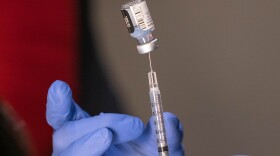On Monday, Feb. 8, the Lower Kuskokwim School District met with the Yukon-Kuskokwim Health Corporation and state health officials to discuss school reopenings. LKSD is working on a phased reentry plan to get students back in school when it is safe.
In January, YKHC stated that three criteria would have to be met before it would recommend a return to in-person school. First, YKHC said that COVID-19 cases in the Y-K Delta would have to drop to below 25 cases per week. Second, less than 3% of coronavirus tests would have to come back positive. And third, any cases within a community had to be linked back to travel.
On Feb. 5, LKSD Superintendent Kimberly Hankins wrote that the district would follow YKHC’s guidelines for reopening schools.
During the Feb. 8 work session, LKSD Board member Hugh Dyment asked how YKHC came up with the numbers for their guidelines.
YKHC’s Environmental Health Director, Brian Lefferts, said that the 25 cases per week number came from the Centers for Disease Control and Prevention. He said that any more than 25 cases per week would indicate that the region is in the highest category of risk for COVID-19 transmission in schools, according to the CDC.
“We didn't go with the lower one or the moderate one, we're saying we just don't want to be in the very highest risk category,” Lefferts said.
On the other hand, the CDC says that having a lower than 3% test positivity rate would indicate that the region is in the lowest category of risk for transmission in schools. YKHC Chief of Staff Dr. Ellen Hodges said that test positivity rates will be lowered if more people get tested. And she said that YKHC is working on an ambitious plan to achieve that goal.
“To test every person in a village twice a week, until the end of the pandemic,” Hodges said.
She said that YKHC would especially target students and teachers at schools for routine testing. Routine testing would also detect cases and allow them to isolate earlier, bringing the total number of cases down. Both the case count and the test positivity rate for the region have decreased since their peak, but are still several times higher than the thresholds set by YKHC for reopening schools
Hodges said that the most effective way to meet YKHC’s guidelines to reopen schools will be for people to get vaccinated. Hodges reported that 28% of the Y-K Delta’s population, and 36% of Bethel’s, have been vaccinated. And since only people age 16 and older can receive the vaccine, she said that means almost 60% of the eligible population has already been vaccinated. But she said that the number of people getting vaccinated would likely slow down.
“The people who are eager to get vaccinated and waiting for it and desperate, you know, people with chronic health conditions or frail relatives, you know, that sort of group, has already kind of come in and vaccinated,” Hodges said. “And so we're moving into the second phase where we're trying to lure people in to be vaccinated, and encourage them about the safety and efficacy of the vaccine.”
LKSD Board Member Dyment echoed a question asked in a previous board meeting: if everyone has had the opportunity to get the vaccine, can schools reopen under the assumption that people who have not gotten the vaccine are accepting the risks?
Health officials answered no. Hodges said that for one, that approach could still overwhelm the health care system, which is fragile in rural Alaska. Plus, she said, the vaccine is only 95% effective, meaning one in 20 people could still be infected. And Dr. Liz Ohlsen from the Alaska Department of Health and Social Services said that it is unknown how effective the vaccines will be against variants of the coronavirus.
Hodges also headed off an idea she had heard that would allow parents to sign a waiver to allow their students to go to school, accepting the risks that entails.
“The problem, of course, would be that it wouldn't just affect that person's family, it could affect their kid’s friend’s grandparents,” Hodges said.
With COVID-19 numbers declining, though, LKSD is putting together a working group to develop a phased reentry plan to reopen schools. Hodges said that she supports reopening schools to Special Ed students, younger children, and high school seniors first. The working group is planning to present a draft of its phased reentry plan at the March board meeting.






